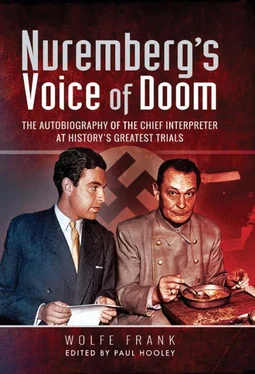In Roger, the Guards officer’s, opinion, ‘The chap had made a slight mistake,’ for his bowels functioned at least eighteen times a day, which, he felt, ‘was a shocking waste of time.’ He had come to the hospital to have his insides ‘re-arranged’.
One afternoon a group of Medical Officers (MOs) drifted into the ward and displayed great concern for Roger’s case. They prescribed a huge quantity of castor oil for the poor chap for the following morning whereupon he would be X-rayed at two in the afternoon. Roger, rather reluctantly, postponed his date with a pretty girlfriend. He swallowed the castor oil and was X-rayed. However, the MOs had departed, and a new batch turned up that afternoon and didn’t like the look of the X-rays. They ordered a repeat performance. Roger phoned his girlfriend. This thing dragged on for five days. Finally, they sent him home on leave, having decided that they could do nothing for him.
I was released from that hospital after ten days and sent to a lovely country house in Shropshire which had become an Army convalescent home. I played a lot of bridge with the CO and he took a liking to me. He felt that I could do better than just sitting around the place but said they couldn’t do anything for me whilst my leg was in a plaster cast.
Then some general came to visit the place and, to mark the occasion, some of the inmates were given home leave. The CO, giving up a bridge partner with considerable regret, added my name to the list. I was to go on home leave for a month until 16 March 1945. The leave orders stated that I was to proceed to my home address and would be notified when and to where I was to report back.
I called Sylvia and she was willing to receive the wounded. I moved in and practised two of my favourite hobbies (the other was cooking).
At this point, the Army chose to forget me altogether. Came the end of March, and I hadn’t heard from them. I contacted a friend at the War Office who told me that I wouldn’t be hearing from them for at least another month since all officers’ convalescent depots were overcrowded. April passed, the war ended. I was still on sick leave.
I would also have been in a cast, still, if I hadn’t taken the initiative to have it taken off at St. George’s Hospital. I wanted to claim the cast which had hundreds of autographs and some nice drawings on it. ‘Sorry,’ said the Doctor, with a twinkle in his eye, ‘we have to keep it for our records.’ My assertion that they were unlawfully seizing War Office property didn’t impress him.
A week after VE Day, and the ensuing five-day shindig, I went back to see my friend at the War Office. ‘Good God man’, said he ‘don’t be an idiot. If we send you back on duty now you’ll be posted to some training regiment. You’ll spend your days drilling recruits. Stay on leave until they send for you.’ He was my senior. I obeyed orders.
My pay kept coming, punctually, at the end of every month. I had acquired an old but worthy automobile and Sylvia and I were enjoying life and each other’s company. She was working during the day, I can’t remember at what, and I was fairly stationary because of the post-plaster condition of my leg. I spent a lot of time on the telephone, but the problem was that it was in the bedroom on the first floor of the duplex flat and by the time I had limped upstairs to answer its ring, the caller had usually hung up. So I got hold of some low-tension wire and built my own extension. Somehow, it didn’t quite correspond to Post Office specifications. When I dialled a number, I found myself listening to somebody’s conversation as often as not. This became a pastime and I heard some fairly priceless talk. One day a couple of War Office colonels were debating on what date an article, ‘By this fellow, Huxley,’ should appear in some Army publication. One of them suggested May, the other September. I inserted my opinion. ‘Maybe, old chap’ I said, ‘we shouldn’t print the stupid thing at all. Nobody will want to read it.’
There was a lengthy silence. ‘Really?’ said one Colonel ‘well…’ but the other had hung up!

22. THE BRITISH WAR CRIMES EXECUTIVE
ON 28 JULY (1945) I WENT TO THE WAR OFFICE once again and asked them to give me a job. They said they would see what they could do.
The telephone was ringing when I returned to Sylvia’s flat. ‘Officer Posting’ was on the line. ‘Frank’ said a bored voice, ‘you’ve just been posted to a thing called the British War Crimes Executive (BWCE). I haven’t a clue as to what it is all about. They’re having a meeting in a couple of hours. You’d better go and find out’.
I proceeded to the meeting forthwith. Half a dozen officers and thirty or so other ranks were waiting. Then a major of the Coldstream Guards raised the most bored voice I had ever heard. His announcement was brief and to the point. ‘This unit will be engaged in collecting material for the prosecution of the major war criminals. That’s Goering and others, you know. We leave on Sunday.’ (This was Wednesday).
There followed some frantic efforts to get hold of my Army kit that was still with the regiment in Chester. The adjutant despatched it at once. It reached me five months later. My new unit was assembling in a transit camp on the coast. Our departure was delayed by two days and I took a staff car to come up to London in order to search Euston station for my kit.
It wasn’t there so I decided to look in on Sylvia and have a bath. I still had a key.
She was having a grand old time with a gent who, judging by his clothes hanging over the bedroom chair, was serving in Uncle Sam’s Navy. At least he was an officer. The following evening, having returned to camp minus kit, minus girlfriend and minus key, I boarded a landing craft as a newly promoted staff captain and in charge of this latest holiday excursion. As I drove my car into the huge belly of the ship I saw a neatly painted inscription on her stern, ‘Is this journey really necessary?’
BWCE had no orders beyond going to Ostend in Belgium where we were to await developments. The crossing, normally a matter of a few hours, took more than a day. Then we rumbled into the badly bombed Belgian port. For the first time in six years I was back on the Continent.
The memory of the Germans was still fresh in everyone’s mind. During the next month I collected enough information to discount the German claim that they had behaved no worse in the countries they had occupied than the Allies in Germany.
We spent a lazy week in Ostend, mostly on the beach, and then received orders to proceed to Paris. There the Americans seemed to have made a start on sorting documents for the forthcoming trial of war criminals. The BWCE, we were told, was to work with the Americans.
Things were chaotic when our convoy arrived in the French capital. BWCE had been assigned a magnificent suite of empty offices in the Boulevard des Capucines, totally empty of furniture. We had precisely one document in our possession. It was Hitler’s infamous ‘ Nacht und Nebel ’ decree, [1] Nacht und Nebel (Night and Fog) was a decree, issued by Hitler in 1941, which dealt with the elimination of persons in occupied territories. Victims of the decree were said to have disappeared into the night and fog without a trace.
ordering the execution of Allied fliers. In order to keep busy, we translated this document, edited the translation, poof-read it and mimeographed [2] A mimeograph was a duplicating machine that forced ink through a stencil.
it. Then we translated it back into German and came up with something totally different from the original text.
Читать дальше













